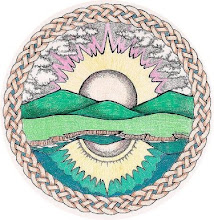It has taken me thirty years or more to remember why and how it was that I had turned my back on Judaism.
There really was nothing much I could put my finger on.
(Dummie Me -- More recently I came to realiuze that a rabbi's ongoing sexual harrassment of me for fourteen years of my adult life had played a major part in my turning my back on Judaism. But it was not the only reason; spiritual seeking in the 70s, 80s and 90s had also played important roles as did my many upsets about the Middle East.
The story of my being a former anti-Semitic, recovcrying Jewish American Princess is a complex story. However, now as I become more and more accustomed to sharing my story and hearing the tales of others, it's even developing some humor.)
I wondered about it on occasion. Yet, not enough to pursue.
Still, it was a bit curious.
Why had I, born and reared in a quasi-Orthodox Jewish family, reached a place of such intense disavowal of this heritage of mine?
Why had I, born and reared in a quasi-Orthodox Jewish family, reached a place of such intense disavowal of this heritage of mine?
To the point that – as my non-Jewish connections grew -- I became staunchly adamant that not only was I NOT a Jew. I was, further, an anti-Semite!
I didn’t really question my stance (though others did, now and then).
Somehow – I simply became less and less interested in Jews and Jewishness.
So much so that, over time, I believed none of it mattered anymore.
Time passed. I became an eclectically spiritual person, more pantheistic than anything, exploring Buddhism and neo-paganism in particular, not recognizing any missing link in my spirit.
Others around me, Jews and non-Jews alike, were doing similarly.
It was, after all, the '80s by then. I developed fewer and fewer Jewish friendships.
Over time, I came to respect the generic Jewish person and his/her apparent values less and less, particularly the monied and status-oriented ones.
These appeared akin to those of my family that I experienced as excessive. I didn’t “approve” of the immoderation.
This, too, fit in with the evolving mentality of my generation.
Though I tried to ignore my feelings they didn’t go away. Instead, they went underground, buried beneath the surface of my conscious mind. Accessible, only if I would have been willing to take a deeper look. I resisted any inclination to do this. I understand this now.
Years passed. Because I was, also, during this time devoting my time to my almost constant book deadlines (ten years (1988 – 1998, writing my three manuscripts for Random House) -- and -- then lost my eyesight (1998 – 2003), I created a very solitary life for myself.
And, believed that this, too, was fine. Of course, 911 made a profound impact on me.
However, because I could only see as if through waxed paper, much of what was happening around me did not penetrate. I couldn’t really watch the news.
And, I interacted with others only slightly. Then one day -- in 2006 – as I was still at the beginning of my return to the mainstream world of sighted people, I realized that I had amends to make to my Jewish heritage.
Separation was not truly an option I could condone any longer in myself.
In fact, I began to see that in order to fully re-engage in mainstream life, I would need to sort out where I stood with this Jewish heritage of mine.
Somehow 911 had made this an imperative.
No longer would it work for me to “pass” in American life without this clarity. At least, not as me; the social activist I had become over the years.
To do this I needed to turn towards Judaism, not away from it.
Without my fully recognizing my intent, I, thus, set out on a journey that would lead me to investigate, not only my separation, but to discover for myself – for the first time -- what I value most about my cultural identity, both as an American and as a Jew. To be continued…




No comments:
Post a Comment